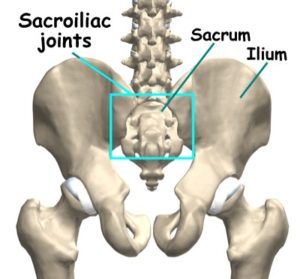 If you have chronic low back pain, arthritic changes to your sacroiliac joint may be the cause. The sacroiliac joint or SI joint (SIJ) is the joint between the sacrum and the ilium bones of the pelvis, which is connected by strong ligaments. In humans, the sacrum supports the spine and is supported in turn by an ilium on each side. Many types of arthritis can affect the SI joint. An estimated 15% to 30% of all low back pain cases originate at the SI joint.
If you have chronic low back pain, arthritic changes to your sacroiliac joint may be the cause. The sacroiliac joint or SI joint (SIJ) is the joint between the sacrum and the ilium bones of the pelvis, which is connected by strong ligaments. In humans, the sacrum supports the spine and is supported in turn by an ilium on each side. Many types of arthritis can affect the SI joint. An estimated 15% to 30% of all low back pain cases originate at the SI joint.
Sacroiliac Joint Anatomy
The sacroiliac (SI) joint is located in the pelvis. It links the iliac bone (pelvis) to the sacrum (lowest part of the spine above the tailbone). This joint transfers weight and forces between your upper body and legs. It is an essential component for energy transfer between the legs and the torso. The sacroiliac joints are among the largest synovial joints in the human body, providing a large potential target of attack by various forms of arthritis.
Symptoms of Sacroiliac Joint Pain
Patients with SI joint pain often report diffuse pain of…
- Pain in the lower back
- Pain in the buttocks, hips, and pelvis
- Pain in the groin
- Pain limited to just one of the SI joints
- Increased pain when standing up from a sitting position
- Stiffness or a burning sensation in the pelvis
- Numbness
- Weakness
Types of Arthritis Associated With Sacroiliitis
Arthritic diseases cause painful joint inflammation and inflammation in the SI joint is know as sacroiliitis. Types of arthritis that can be associated with sacroiliitis include…
- Osteoarthritis – The most common form of arthritis, affecting millions of people worldwide is osteoarthritis. It occurs when the protective cartilage that cushions the ends of your bones wears down over time. Although osteoarthritis can damage any joint, the disorder most commonly affects joints in your hands, knees, hips, and spine. More than 32 million Americans have symptoms of osteoarthritis.
- Rheumatoid Arthritis – A chronic progressive disease-causing inflammation in the joints and resulting in painful deformity and immobility, especially in the fingers, wrists, feet, and ankle. While initials symptoms of RA typically affect smaller joints it is possible for the sacroiliac joint to be affected.
- Lupus – A long-term autoimmune disease in which the body’s immune system becomes hyperactive and attacks normal, healthy tissue. Symptoms include inflammation, swelling, and damage to the joints, skin, kidneys, blood, heart, and lungs. Many patients with Lupus develop SI joint pain as one of their symptoms.
- Ankylosing Spondylitis – An inflammatory arthritis affecting the spine and large joints. The condition is more common among men and usually begins in early adulthood. Symptoms typically appear in early adulthood and include reduced flexibility in the spine. This reduced flexibility eventually results in a hunched-forward posture. Pain in the back and joints is also common. Frequently, SI joint pain and spontaneous spinal joint fusion are the initial presenting symptoms for patients with ankylosing spondylitis.
- Psoriatic Arthritis – A chronic autoimmune disease that is closely associated with a skin condition called psoriasis, but not everyone who has psoriatic arthritis also gets psoriasis. Medical studies report the prevalence of sacroiliitis inpatient with psoriatic arthritis to be between 34% and 78%. Patients with psoriasis and chronic lower back pain should consider having a sacroiliac joint assessment with a musculoskeletal specialist.
- Gout and Pseudogout – While gout is caused by uric acid crystals; pseudogout is caused by calcium pyrophosphate dihydrate crystals (CPPD). And though the two have similar symptoms, treatment is somewhat different. Pseudogout causes sudden attacks of joint pain, swelling, and warmth. The attacks can last for days to weeks. While the most common site for gout attacks is the big toe, the sacroiliac joints can also be affected. If you have been diagnosed with gout or pseudogout and you have lower back pain, consider the possible connection with your doctor.
- Reactive Arthritis – Reactive arthritis is joint pain and swelling triggered by an infection in another part of your body — most often your intestines, genitals, or urinary tract. Reactive arthritis usually targets your knees and the joints of your ankles and feet. Inflammation also can affect your eyes, skin, and urethra inflammation of the sacroiliac joint and forth part of the spinal column are common symptoms of reactive arthritis.
Other potential causes of SI joint pain
In addition to arthritis, SI joint pain may be caused by…
- Heavy lifting, prolonged physical activity, and manual labor
- Prolonged sitting or standing
- Traumatic injuries such as falls
- Pregnancy
- Lumbar spinal fusion surgery
It is essential to have a complete assessment of your condition by a qualified medical professional if you have lower back pain. Due to the many possible causes of sacroiliac joint pain contact your primary care provider for more information and diagnostic evaluation.
For persistent joint pain that is interfering with your daily activities, see a Tristate rheumatologist to make the correct diagnosis and begin the proper treatment.
Contact Us (859-331-3100) For More Information to Request an Appointment
—
 About Tristate Arthritis and Rheumatology
About Tristate Arthritis and Rheumatology
Tristate Arthritis and Rheumatology is first and largest Rheumatology practice in the Northern Kentucky area. Founded by Dr. Arthur Kunath in 1986, our rheumatology practice now consists of six doctors who are board certified in both Internal Medicine and Rheumatology and a Physician Assistant. Patients see one doctor (except in emergencies), thereby assuring continuity of care and an individualized doctor-patient atmosphere giving the physician the ability to establish personalized and detailed relationships. Our doctors have received numerous awards, including being listed as “Top Doctors” in Cincinnati Magazine, receiving the Patient’s Choice Award, the Most Compassionate Doctor Award, and the American College of Rheumatology’s “My Doc Rocks” award.
>> Learn More


